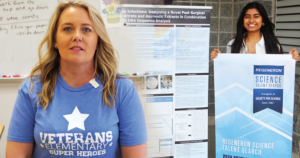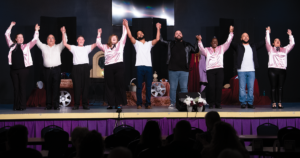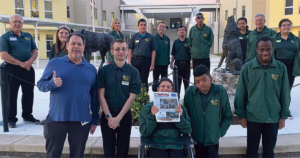
The motion picture industry in Florida has had its ups and downs.
For example, Florida was a boomtown in 2011 when “Dolphin Tale” was being filmed in Clearwater.
But, more recently? Consider Ben Affleck’s 1920s gangster-era film entitled “Live By Night,” which premieres worldwide on January 13. The movie is set in Ybor City.
There’s only one problem, however — it was shot entirely in Brunswick, GA, which was able to offer the film’s producers as much as 30 percent in tax credits on expenditures.
Cities in Florida couldn’t match that, and therefore lost a golden opportunity to bring revenue to the area and build the filmmaking industry in the region and state.
When state funds for film incentives dried up in 2012, the onus fell to local production companies to pick up the mantle.
Guys like Wesley Chapel’s Todd Yonteck, the CEO of his production company called Digital Caviar.
The Red Carpet
If you happened to have been promenading downtown St. Petersburg on December 7, you might have seen a red carpet rollout at the AMC Theatres Sundial on 2nd Ave.

Decked out on the carpet were acclaimed actors Dahlia Lagault (“The Walking Dead” Seasons 5 and 6) and Patrick Muldoon (“Starship Troopers”) for the premier of their new film, “Bernie the Dolphin.”
Actors, producers and writers huddled together for photos, took interviews and later filed into Theatre 1 for the film’s first theatrical screening, its world premiere.
“Bernie the Dolphin,” which Yonteck helped produce, was shot entirely in Pinellas County and at Marineland Dolphin Adventure in St. Augustine.
Yonteck is a Seven Oaks resident and an emergency room physician at AdventHealth Wesley Chapel. You could call film production his side hustle, although considering the amount of work involved, it’s much more than that.
“I have two jobs that are full time,” Yonteck said, after the premiere of “Bernie the Dolphin.”
In 2010, Yonteck and a friend, Paul Prator, began dabbling in film production. Initially, they took on a lot of commercial work. In 2013, they opened a storefront in Ybor City.
By 2015, a second office had opened and Prator stepped away from the company.
The commercial work was steady, Yonteck says. He booked and produced commercials for Verizon and USF.
But, something was missing.
“You don’t get to have as much creative fun with commercials,” Yonteck says.
His transition to more creative projects began slowly in 2013, when Digital Caviar had begun to produce some short films.

Staffers like partners Michael Brown, Victor Young and Conrad De La Torres came on board. Staffers Josh Long, Brandon Hyde and Brittany Hoppe also joined the company.
Digital Caviar’s first feature film came out in April of 2015, when “Crazy Lake,” a slasher film shot almost entirely in Brooksville, was released.
In December of 2015, the company embarked on a comedy, “Tropical Paradise 2.”
In 2017, Yonteck and Digital Caviar were hired to help on a joint production between Sarasota’s Ringling College of Art & Design and director Kevin Smith — famous for the cult film “Clerks” — called “Killroy Was Here.”
“The project started as a short in order to help the students get hands-on experience, doing the actual jobs in a production and also deliver the film,” Yonteck said. “It went so well and Kevin (Smith) was so excited after the shooting experience that he wanted to turn it into a feature.”
Smith came back in January of 2018, and then again over the summer, to finish principal shooting. The film is currently in post-production under Smith.
Before the chance to work on “Bernie the Dolphin” came along, Yonteck had seven producer credits — six for short films — to his name, as well as others for camera and electrical equipment, editorial, sound and production manager.
The concept for “Bernie the Dolphin” began circulating in 2017 when Yonteck, a longtime attendee of the Cannes Film Festival in France, could not attend.
“We either go or we send someone (to Cannes) every year,” Yonteck says. “It’s a great place to search for source material and to network. People see you, hear your name a few times and they’re more comfortable working with you.”
Yonteck wasn’t in attendance at the 2017 festival, but St. Petersburg Film Commissioner Tony Armer was.
Yonteck says that Armer got into conversation with reps from Grindstone, a branch of Lionsgate. The Lionsgate reps were talking up a concept that involved dolphins and oceanside locations.
Armer worked to convince them that Florida, Pinellas County in particular, had the locations they needed and the production companies to interview to make it happen.
By May of 2017, Grindstone and Digital Caviar were in contact and a local Clearwater-based writer, Teri Emerson, was tapped to write the script.
“The project was pretty much green lit by August of 2017,” Yonteck said. “We started finding the people to put it together and we had most of it solidified by the end of the year.”
Principal shooting began in January of 2018.
Keeping It Local
Yonteck was happy to work on a project filmed in Florida. Many film projects have left the state for better incentives elsewhere, reducing the number of opportunities for local producers.
The 2012 film “Magic Mike” was made in Florida, but the 2015 sequel, which is partially set in Tampa, was shot entirely in South Carolina. And, the 2017 drama “Gifted,” which is set in St. Petersburg, was actually filmed in Savannah, GA.
Georgia, thanks to its 30-percent tax incentive, now ranks third in the nation for film and television production and, according to an April 2017 story in the Atlanta Business Chronicle, had an economic impact of $7 billion in 2016.
“People talk about the Ben Affleck movie a lot, how it was written for Tampa, it was a story about Tampa and Ybor City, but they ended up building Ybor City in Georgia,” Yonteck says. “They just got so much value in incentives.”
The effect a movie can have on local business and a local economy often cannot be understated.
When the first “Dolphin Tale” movie was released in 2011, after having used the Clearwater Marine Aquarium for a major location, it bolstered tourism in Florida by more than $2 billion, according to a March 2015 article in The Hollywood Reporter.
Attendance at the aquarium spiked from 76,000 to 750,000 annually the year after the film’s release. Unfortunately for industry workers in the area, the film’s production company, Warner Brothers, isn’t based in Florida.
“A lot of the money in incentives that we did have went to big projects like ‘Dolphin Tale,’” Yonteck said. “I think it’s better to give the incentives to companies that stay and don’t pack up and leave when they finish shooting.”
The cast and crew for “Bernie the Dolphin” was almost entirely Floridian. The same holds true for the cast and crew of “Bernie the Dolphin 2,” which will be released in 2019.
“A lot of the actors were locally cast and the entire crew was Florida-based,” Yonteck says. “People are going to where the work is. We’ve been able to keep some people here in town but it’s hard to find good talent and when you train people up, they often go elsewhere but we’re going to keep trying to shoot here.”
The production shifted back and forth between St. Petersburg, Clearwater and St. Augustine. What worked for “Bernie the Dolphin” was the production value of the ocean access in Pinellas County, as well as at the ocean park in St. Augustine. The film was shot in January, taking advantage of the mild winter in Florida. However, Yonteck says a couple of cold blasts made for some funny moments in production.
“One day of shooting it was super windy and cold on the beach,” he says. “It was kind of funny because the actors were freezing and we had to make it look like it was warm.”
With “Bernie the Dolphin 2” already in post-production, Yonteck and Digital Caviar continue to support the film industry in the region and state in their efforts to make Florida competitive and more attractive for filmmakers.
Oh, and by the way— Yonteck provides a tip of the cap to his current hometown in “Bernie The Dolphin” as well.
An Easter egg — generally an inside joke hidden in a film or video game — in the film comes in the form of Yonteck’s boat, “Impulse Buy,” which acted as a platform and support boat, and it also was featured as the boat belonging to Kevin Sorbo’s character, Winston Mills.
Only a local might catch “Wesley Chapel, Florida” emblazoned on the boat’s stern, during an aerial drone shot, but we sure did.
Want To See It?
Bernie the Dolphin is currently available in On Demand options for cable/satellite customers that include Frontier and Spectrum. It also is available through iTunes. Yonteck expects an electronic copy or Blu-Ray option to be available for purchase by February.




No comment yet, add your voice below!